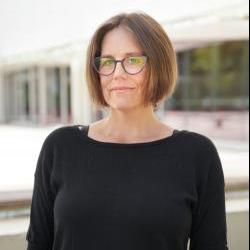- About Archives
- About SAA
- Careers
- Education
- Publications
- Advocacy
- Membership

Abstract
Tamarin Norwood is a writer, a life writing scholar, and a bereaved mother. In an award-winning essay published in the prestigious medical journal The Lancet, Norwood reflects on the care she received in hospital after the death of her newborn son and introduces the notion of institutional love. Referring to how nurses and other hospital staff interacted with her family, and especially how hospital staff helped the family to form memories together, Norwood understands the way that staff “knew to put in our way something good” as a form of love “as it is manifested in institutions.” Central to institutional love is the fact that it is based on consultation, research, planning, assessment and ethics. This is not the love of individual carers; it is love that is based on understanding patient needs and building responsive care directly into institutional policies and practices. As such, there is an important distinction to be made between personal caregiving, which often goes unrecognized and unsupported in workplaces, and institutional love, which is embedded in institutional systems, spaces, training and practices.
This talk will draw on my research about grieving and recordkeeping with both bereaved records creators and practicing archivists, as well as on the expanding critical literature on trauma-informed archival praxis and affect and emotions in archival work to consider what institutional love might look like in archival repositories, sketch the transformative work necessary to achieve it, and argue for its prioritization in the face of current social, cultural, fiscal and environmental pressures on archival institutions. This exploration will be grounded in a critical reading of discourses of love, care and affect as they have been deployed in archival theory over the last several years, as well as in the broader critical literature on feminist love studies and feminist care ethics. The talk attempts to bring these different focuses together to propose a theory of critical archival care that can inform the development of institutional love as praxis for the archival discipline and profession.
Biography
Jennifer Douglas (she/her) is an associate professor in the Master of Archival Studies program at the School of Information, University of British Columbia, where she teaches courses on arrangement and description and personal and community archives. Her research has focused on the roles of recordkeeping and archive making in the intimate lives of individuals and communities and archivists’ responsibilities to represent, support and make space for these roles. Her research on griefwork in archives and on creators and care has been supported by the Social Sciences and Humanities Research Council. She is co-lead of Community Archives Collecting and Heritage Exhibitions (CACHE), a stream in the UBC Research Excellence Cluster Creating Better Community-Engaged Asian Canadian Research, and is lead for the UBC team of Faculty Organizing for Community Archives Support (FOCAS), funded by the Mellon Public Knowledge Program. She lives and works on the traditional, ancestral and unceded territory of the Musqueam people.
Hi all! So, I found www.nastyhookups.com/pegging-dating.html through a late-night post on a forum. It’s for adults 18+ who are confident, curious, and just want to meet people with the same attitude. I liked how open everyone was — you can chat, share thoughts, and enjoy the vibe without pressure. It’s fun to see real people having honest conversations and keeping things light-hearted at the same time.
Fast dating sites are a real opportunity to find interesting people. I used https://www.fetfantazy.com/ the platform helps to quickly connect to communication with those who share views and interests. Using modern communication tools is convenient, especially when everything works clearly and without delays.